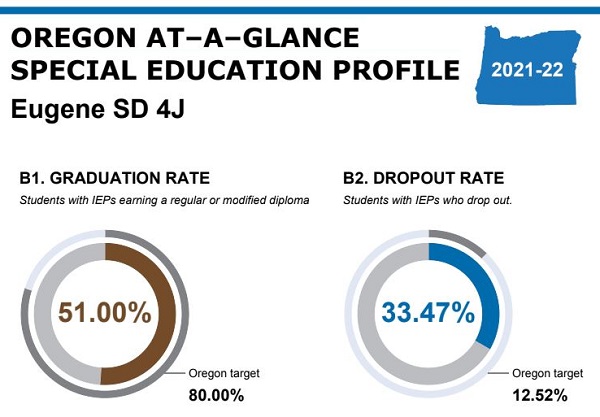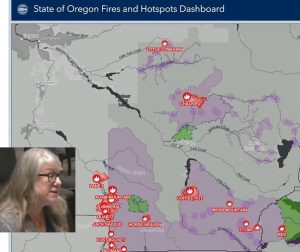Parents say 4J special education students are set up to fail
7 min read
Parents say that 4J’s special education program is “a setup for failure.” At the Nov. 15 board meeting:
Valerie Blood: I’m a parent of two children in 4J’s special education program. My kindergartner is in a Life Skills class. My oldest child is in the second grade. They do not attend the same school. 4J likes to state that they are all about inclusion. Inclusion is not occurring in our schools. Instead of creating an understanding and welcoming place for all students, 4J is causing division and animosity towards neurodivergent students, as well as an unsafe learning environment for all students.
[00:00:40] You cannot include children that need substantial support in the general education classroom without the actual supports in place. I know the board does not handle staffing. However, the board creates policies that build the framework that decides the staffing. If you want to include students from the special education program, then you need to support those students.
[00:01:02] This is not an issue that we can wait on. Scheduling workshops and town halls are not going to solve our problems today. All of the children in 4J are being affected now. I will not allow my children to receive anything less than all of the other children in this district. They deserve their free, appropriate public education.
[00:01:21] It’s also not just neurodivergent children that need assistance in the classroom. It is all of our younger students that began their schooling after the pandemic. My child in Life Skills does not participate in his general education classroom. That has to do with lack of support staff and the district’s lack of understanding on how to support neurodivergent students.
[00:01:41] My oldest child should have the support the entire time she is at school. It should never come down to, ‘Well, she eventually needs to learn to be self-sufficient. She needs to learn to be flexible. She needs to be able to self-regulate.’ Those are things that will take years, if not her entire life, to learn.
[00:01:57] Should my daughter and other students in her class have less instruction time because of my daughter’s disabilities? Do you see how that is not inclusion? My child does not want to have sensory overload and to feel dysregulated every single day. She does not want to disrupt the classroom when it becomes too much for her to handle.
[00:02:16] If the proper training is put into place for all the staff in the 4J community, as well as putting the actual staff in place, then we can have a successful environment for learning to take place for all students. The board and the district need to do better. You need to review and update your pre-pandemic policies. The superintendent needs to update the administrative rules.
[00:02:36] As a parent and community member, it is extremely apparent that 4J is not in compliance with the Individuals with Disabilities Education Act and the Oregon state laws and statutes in regards to education. You have a job to do and so do I. It is my job to be the voice for my children and to hold the board and 4J accountable for the education, safety, and actual inclusion of all students.
[00:03:00] I look forward to seeing the immediate changes that need to take place.
[00:03:03] Amy Fellows: My name is Amy Fellows. I am a graduate of 4J and the parent of a ninth-grade student. I believe I’ve met with all of you at some point during your campaigns or while you were working as board members.
[00:03:14] I am speaking tonight because I am concerned about the disabled students in 4J having accessible education and a safe trauma-informed anti-ableist environment.
[00:03:25] The 2021 ODE data shows 4J graduation rates for students on IEPs to be 51% with a 33.47% dropout rate. This is not acceptable. And this is only tracked once the student enters ninth grade with a high school cohort. Prior to that, the many disabled students pushed out of 4J in elementary and middle school do not seem to be tracked.
[00:03:51] I would love to know that data, having experienced pushout of my student in second grade that led to six years of homeschooling through a public charter program and 4J’s loss of those fed dollars. Our situation is not unique by any means, as I’ve learned from other 4J parents.
[00:04:08] I shared my lived experience as a parent navigating SPED by providing IEP and advocacy support for other parents, and I was part of a group of SPED parents that met before the board last April 2023 to discuss challenges our students have had with accessible education in 4J.
[00:04:25] We shared a website our group created to support teachers in the district with resources and best practices in accommodating students on IEPs. The website is specialeducationethics.com. This website has now been shared with other districts, ODE, and OHA staff.
[00:04:41] Since meeting last spring, many of the concerns we shared have amplified in the further rollout of the inclusion model in local online SPED forum, parent forums and at the Oct. 25 SPED family event, parents are expressing great concern about their kids not getting the needed EA support in general education classrooms and IEP and 504 accommodations not being followed.
[00:05:05] I am also deeply concerned that the University of Oregon has received $21 million from the U.S. Department of Education. For 25 years, the UO Center on Positive Behavioral Interventions and Supports, PBIS, has been deeply involved in 4J and other Oregon districts, with PBIS being the main tool for classroom management. After all this time, it doesn’t appear to be working.
[00:05:28] PBIS punishes students for their disability by withholding token rewards their neurotypical peers can easily achieve and using planned ignoring when students need connection, not rejection, when they are distressed.
[00:05:42] … Rebranding PBIS as ‘trauma-informed’ or ‘culturally responsive’ does not make it so. And I hope to not see 4J further investing in PBIS, as tempting as it might be, if U of O offers further funding from this new grant.
[00:05:57] At the Oct. 25 SPED Family Meeting, it was a great start to create more transparency and bidirectional communication with SPED families. And I understand there will be three more this year in January, March, and May. We’d love to see board members attend these. I really hope they are not cancelled as the Neurodivergent Town Hall that was scheduled for tomorrow night was just cancelled this Monday.
[00:06:23] Jeni Canaday: I am a 4J parent with many years of lived experience in navigating special education challenges with my own children. I am also a trained IEP advocate and family support specialist, and am the member of a parent support group with over 1,200 local parents of children on 504s and IEPs.
[00:06:42] I spoke to the board one year ago, almost to the day, about concerns around the state of special education in 4J. Those concerns have only grown. It is imperative that we hold an empathetic stance when we are talking about the behavior challenges faced by struggling children. All too often, I see disabled children and their families being blamed and shamed by an educational system that fails to comply with the IDEA laws that were put in place to make true inclusion a real possibility.
[00:07:14] Our schools are in crisis. Teachers do not have the ability to form trusting and safe relationships with every student in a classroom of 30+ kids. The result of this is often the suspension and or push out of some of our most vulnerable students. Others are much more likely to be chronically absent due to an inability to tolerate an environment that has inadvertently set them up to fail.
[00:07:39] We cannot claim students experiencing behavior challenges are the problem when behavior data does not tell a child’s story and behavior interventions will not fix a resource problem. When a neurodivergent student has a meltdown because they are being teased for wearing noise canceling headphones, a behavior plan will not help, it will cause harm.
[00:07:59] These children need to be understood and appropriately supported. Behavior is an indication. This means that the behavior intervention model is not working for the kids who need the most support. If we want to make our schools safe, we must ensure IDEA laws are being followed. This is a critical component to creating an anti-ableist school environment.
[00:08:21] Training staff in co-regulation skills and collaborative problem solving would benefit the entire school community. Teaching children about neurodiversity is a necessity and a successful solution. To any successful inclusion model, it will shift the focus away from ineffective behavior lens and towards relational health.
[00:08:42] So I’m here to say this once again. When a school district moves to a full inclusion model, without having the proper trainings and supports in place, their inclusion model has failed before it can even start. Not only has it failed, but it has actually done harm. Because now all of the teachers… Who are left without the supports they need to provide a free and appropriate public education in the least restrictive environment are frustrated and distressed.
[00:09:10] Kids can feel that, and the students who communicate their distress behaviorally are seen by many as incapable of successfully integrating into the gen ed classroom without ever having been given a fair shot. That is not an inclusion model. It’s a set up for failure.
[00:09:28] John Q: We’ve reached out to the University of Oregon for their response. Parents express concern that 4J is setting up their children to fail.



